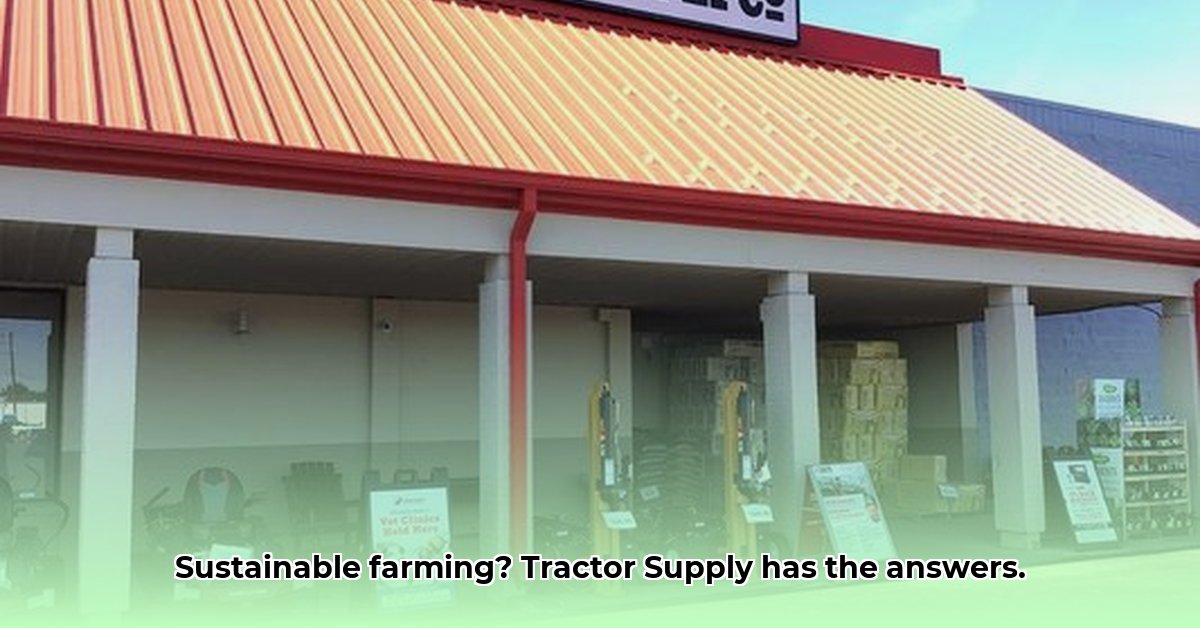
Tractor Supply (TSC) in Ashland, Ohio, serves as a vital resource for local farmers and gardeners. However, the extent to which this store actively supports sustainable agricultural practices requires closer examination. This article investigates TSC's Ashland location, analyzing its product offerings, evaluating its transparency regarding sustainability initiatives, and proposing concrete steps to enhance its contribution to environmentally friendly farming in the community. For example, water conservation is crucial, and you can find water storage solutions.
A Closer Look at TSC's Product Portfolio
TSC's Ashland store offers a wide array of products relevant to various farming methods. While organic seeds, water-efficient irrigation systems, and other eco-friendly items are likely available, their prominence within the overall product selection is unclear. A significant challenge lies in easily identifying these sustainable options amidst the vast inventory. This lack of clear demarcation hampers consumers in their efforts to make environmentally conscious choices. How many farmers are even aware of these sustainable product options?
Unveiling the Shortcomings: Sustainability Transparency
Despite Tractor Supply's published commitment to emissions reductions 1, a notable gap exists in their public communication regarding their broader sustainability efforts. The company's marketing materials lack emphasis on sustainable sourcing, eco-friendly product choices, or specific programs to promote sustainable practices. This lack of transparency presents a substantial missed opportunity to engage environmentally-conscious consumers and actively encourage the adoption of sustainable agricultural practices within the Ashland community. How does Tractor Supply demonstrate a commitment to sustainable sourcing beyond its published carbon reduction numbers?
The Untapped Potential of Community Engagement
TSC's strategic location in Ashland provides an ideal platform for fostering community engagement in sustainable agriculture. Imagine the potential impact of educational workshops focusing on water conservation, organic farming techniques, or improved soil health, conducted in collaboration with local experts and agricultural organizations. This proactive approach could transform TSC from a mere supplier into a vital catalyst for building a more sustainable agricultural future in the region. What specific partnerships could TSC forge to maximize its community impact?
Actionable Steps Towards a Greener Future
Significant improvements are possible with targeted actions. Below are concrete steps that TSC, local farmers, and the Ashland community can take to create a more environmentally-conscious agricultural ecosystem:
Tractor Supply's Actions: Conduct a comprehensive sustainability audit of product sourcing, packaging, and operational efficiency; prominently display and clearly label eco-friendly products; invest in employee training to equip staff with the expertise to advise customers on sustainable farming practices.
Supporting Local Farmers: Offer educational workshops and events on sustainable farming techniques; highlight the successes of local farmers using sustainable practices; create a platform for knowledge sharing among local farmers through meetups or online forums.
Community Collaboration: Partner with local environmental groups, agricultural extension offices, and community leaders; support local food systems through farmer's markets and community-based initiatives.
Consumer Empowerment: Encourage informed consumer choices by demanding transparency from businesses regarding sustainability initiatives; actively support companies demonstrably committed to sustainable practices.
Conclusion: A Call for Collaborative Action
Tractor Supply's Ashland store possesses the potential to become a champion of sustainable agriculture. However, realizing this potential depends on a clear commitment to transparency, active community engagement, and meaningful collaboration with local farmers and organizations. The path to a greener future for Ashland's agricultural sector requires not merely the provision of sustainable supplies, but also the promotion of knowledge sharing and a concerted effort in building a more environmentally-conscious farming community. The journey towards a sustainable future begins with collective action.